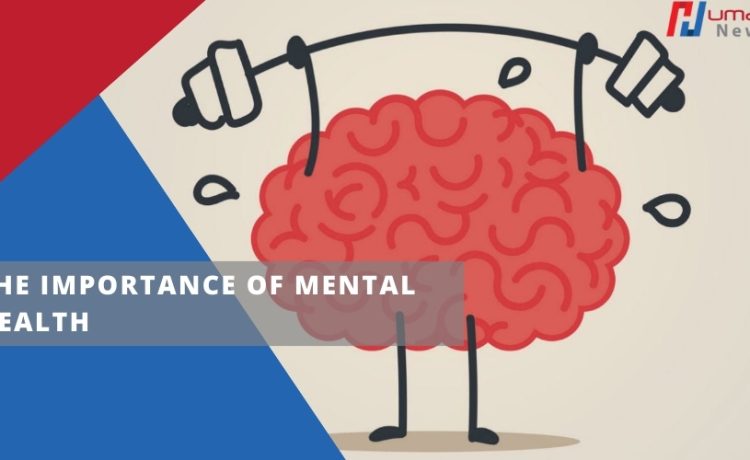A vital component of your overall wellbeing is your mental health. Your ability to function socially, emotionally, and mentally is influenced by this component of your welfare, among other things.
Given how much your mental health affects every part of your life, it’s critical to protect and enhance psychological wellness with the right treatments.
The importance of mental health
We’ll be identifying risk factors and indicators of mental distress because various situations might have an impact on your mental health. Most significantly, though, we’ll explore the importance of mental health.
Risk Factors for Poor Mental Health

Mental health is defined as a condition of well-being in which a person can deal with the usual stressors of life. In this state, one may accomplish worthwhile work and make significant improvements to society.
On the other hand, a number of circumstances may affect an individual’s capacity to handle unforeseen obstacles in life. Your ability to adjust to these changes and your daily routine may also be disrupted by these conditions. That’s not the only reason mental wellness is so important.
The following factors may have an effect on mental health and raise the likelihood of acquiring psychological disorders.
Childhood Abuse
Childhood physical assault, sexual violence, emotional abuse, or neglect can all result in serious mental and emotional trauma. Abuse raises the likelihood of acquiring mental illnesses such as depression, anxiety, post-traumatic stress disorder, and personality problems.
Children who have been abused may develop problems with alcohol and other substances. Aside from mental health issues, child abuse can lead to bodily difficulties like diabetes, stroke, and other types of heart disease.
The Environment
The state of a person’s typical environment has a significant impact on their mental well-being. Adverse environmental situations can have a negative impact on psychological health.
For instance, changes in the weather may be a factor in the rise in suicide instances. In a similar vein, being there at the scene of a natural disaster increases one’s risk of developing PTSD. In some cases, depression symptoms may be adversely affected by air pollution.
Living in a positive social setting, on the other hand, can protect you from mental health problems.
Biology
Your general health may be impacted by your biological composition. A number of mental health issues have been linked to family history and may be passed down.
Autism, attention deficit hyperactivity disorder, bipolar disorder, depression, and schizophrenia are among the conditions covered.
Lifestyle
Your lifestyle can have an impact on your mental health. Smoking, eating a bad diet, drinking alcohol, using drugs, and engaging in unsafe sexual conduct can all cause psychological trauma. These habits have been associated with depression.
Signs of Mental Health Problems
It’s not always evident to the individual or everyone around them when someone’s mental health is failing. However, there are several warning signals to look for that could indicate unfavorable changes in one’s well-being. This includes:
- A change in eating patterns, whether overeating or undereating
- A notable drop in energy levels.
- Become more reclusive and shy away from others.
- Feeling continuous despair.
- Abuse of alcohol, cigarettes, or other drugs excessively
- Experience unexplainable bewilderment, anger, guilt, or worry.
- Serious mood swings
- Starting fights with family and friends
- Hearing voices without an identifiable source
- Thinking about self-harm or harming others
- Being unable to conduct daily duties easily.
Benefits of Good Mental Health
A Stronger Ability to Cope with Life’s Stressors
When mental and emotional states are healthy, individuals are better equipped to navigate life’s challenges. Instead of resorting to negative coping mechanisms like alcohol or isolation, those with good mental health can face difficulties head-on with healthier strategies.
A Positive Self-Image
Good mental health is closely tied to self-esteem. Individuals with a healthy mental state are more likely to have a positive self-image and set ambitious goals for themselves. Confidence is a key indicator of mental wellness.
Healthier Relationships
Maintaining good mental health can improve relationships with friends and family. Emotional stability allows individuals to provide support, affection, and quality time to their loved ones.
Better Productivity
Mental health significantly impacts productivity levels. When individuals feel mentally strong, they are more likely to work efficiently and produce high-quality results.
Higher Quality of Life
A thriving mental state leads to an improved quality of life. Individuals with good mental health may engage more in community activities, explore new hobbies, travel, and make meaningful connections.
How to Maintain Mental Health and Well-Being

To preserve mental well-being, it is essential to adopt healthy lifestyle practices. Regular exercise, sufficient rest, meditation, learning coping skills, staying connected with loved ones, and maintaining a positive outlook are all crucial for mental health.
Seeking professional guidance through therapy can also be beneficial. Therapy equips individuals with healthier coping mechanisms, addresses negative behaviors, and provides tools for personal growth.
Conclusion:
In summary, it is impossible to overstate the significance of mental health. By taking care of our mental well-being, we can improve our quality of life, build stronger relationships, and better cope with the challenges that come our way. If you are having difficulty dealing with mental health issues on your own, do not be afraid to seek help from a certified therapist.







